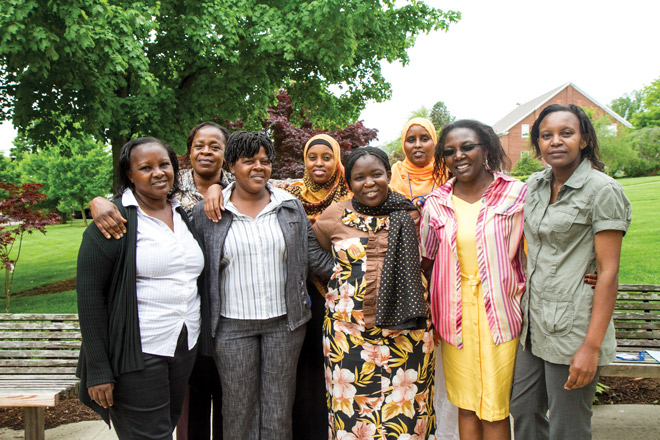
Among the 184 people who studied at SPI 2014 were eight Kenyan women in the Women’s Peacebuilding Leadership Program (WPLP). Ranging in age from 23 to 51, the women work for a variety of NGOs or in academia across Kenya. Now in its third year, the WPLP admits students in cohorts from specific areas of the world to develop peacebuilding and leadership skills over an 18-month period, culminating in a graduate certificate from the Center for Justice and Peacebuilding. CJP works with partner organizations to identify candidates, and matches students with mentors. Previous cohorts have come from Somaliland, Liberia and the South Pacific. This is the story of one of the eight women in the current cohort.
Though it sits just outside Waji, a major town in Kenya’s North Eastern Province, the small village of Leheley has yet to join the electrical grid. The people who live there are poor and therefore marginalized. Running power lines there simply isn’t a priority to those in charge.
“My people support the leaders 100%, but their support is not reciprocated with any kind of development in the village,” says Shamsa Omar, who grew up in Leheley.
Education was Omar’s springboard out of Leheley and on to bigger ambitions. After earning top-notch grades at Wajir Girls Secondary School, she won a scholarship from a Kenyan bank to study at Moi University. And while still finishing up a BA in sociology, Omar launched a campaign to represent the Lagboghol South ward on the Wajir County Council, determined to let Leheley be ignored no longer.
She ran an enthusiastic campaign and says she’d drummed up widespread support until, just days before the March 2013 election, things came to a screeching halt. The elders in the community decided that Omar shouldn’t run, and that was that. What the elders say goes, even when you’re a young, status quo-bucking political candidate like Omar.
“I was very discouraged because I had the support of the people,” says Omar, now 23 years old.
Omar returned to the university to finish her degree and, since September 2013, has been working for the Center for Victims of Torture, an American NGO based in St. Paul, Minnesota. She now works as a psychosocial counselor in northeastern Kenya’s Dadaab, the world’s largest refugee camp, home to hundreds of thousands who have fled conflicts in countries all over East Africa. In the camp, Omar leads individual and group therapy for victims of torture and gender-based violence – intense and sometimes distressing work that has caused nightmares.
It has also exposed her to an inspiring resilience that she sees in some of her clients. Before she began working as a counselor, Omar wasn’t convinced that sitting around and talking would do any good solving people’s problems. Now, she’s a believer.
She’s applying a resilience of her own to her goals for her home. After her run for office was cut disappointingly short, Omar realized that there are “many other ways” to lead. Accordingly, she founded the Wajir Young Women’s Association, through which she hopes to work with like-minded young women to improve the lives of women throughout the region. She also serves as a mentor to current recipients of the same scholarship that allowed her to get her undergraduate degree.
Omar says her experience so far in the WPLP has opened her mind, inspired and energized her – through the things she’s learned and her peers in the program.
“I cannot walk alone on this journey. I need so many people to help me out,” she says. “I have so many things in my mind. I have big dreams for my community.” — Andrew Jenner